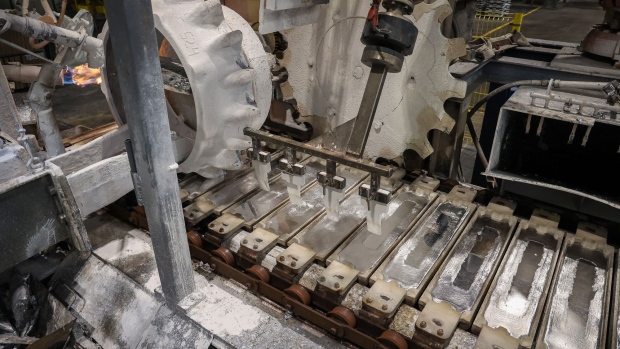Oct 6, 2022
LME Opens Door to Potential Ban on New Supplies of Russian Metal
, Bloomberg News

(Bloomberg) -- The London Metal Exchange began a formal discussion on a potential ban on new Russian metal as a response to growing concerns in the market over how to handle the country’s supplies.
Any move by the LME could have a significant impact on global metals markets such as aluminum, nickel and copper, which so far have not been targeted by broad western sanctions against Russia. It could also hit top Russian producers like United Co. Rusal International PJSC and MMC Norilsk Nickel PJSC by making traders and manufacturers less willing to buy their metal.
The LME didn’t express a preference for any particular course of action, but laid out a series of possible options ranging from taking no action through to banning all new deliveries of Russian metal to its warehouses as soon as the results of the discussion are published. Market participants have three weeks to submit their views.
The metals world has been wrestling for months over how to handle Russian production, but the debate has recently come to a head as the industry began its annual ritual of renegotiating supply contracts. Some buyers are shunning Russian metal, and there are concerns that big volumes of unwanted supplies could end up dumped on the LME, creating distortions in the global benchmark price.
Until now the LME, which is owned by Hong Kong Exchanges & Clearing Ltd., had said it wouldn’t act beyond the scope of western sanctions against Russia. However, the exchange believes that consumers’ willingness to use it has evolved, it said in its discussion paper on Thursday.
“As the current negotiation period for 2023 supply agreements progresses, the LME understands that an increasing number of consumers may be expressing an unwillingness to accept Russian metal in 2023,” it said. “As a result, and in light of the potentially changing market landscape, the LME now considers it appropriate to gather further data and views.”
Metal producers typically sell directly to consumers and traders, and banning new deliveries of Russian metal into the LME wouldn’t necessarily stop that flow. But the ability to deliver metal to the exchange is an important backstop for traders and financiers of commodities, particularly in economic downturns when demand from manufacturers falls. As a result, metal that can’t be delivered to the LME typically trades at a discount to metal that can.
Russian producers like Rusal and Nornickel have historically provided a large share of the metal traded on the LME, meaning that a ban could have a significant impact on the markets. Over the past decade, Russian nickel accounted for as much as 65% of exchange inventories, Russian aluminum had accounted for as much as 74%, and Russian copper for as much as 95%, the LME said.
For the LME price, banning new deliveries of Russian metal would remove a potential source of supply. When Bloomberg first reported the LME’s plans to issue a discussion paper last week, aluminum jumped by the most on record.
The most draconian option set out by the LME would involve immediately banning all deliveries of Russian metal as soon as the results of the discussion paper are published. The exchange is seeking feedback by Oct. 28. While it didn’t say how soon after that the results would be published, on previous occasions it has reached a conclusion within weeks -- meaning a ban could be in place as soon as November.
“Applying the suspension to all Russian metal (excluding that which is already warranted) is the most straightforward approach from a practical perspective,” the LME said. This option would also limit the risk that large volumes of Russian metal could be delivered before a suspension.
‘Impending Crisis’
The debate over Russian metal has intensified over the past month, with some large US and European metal companies waging a campaign to block new deliveries from the country, Bloomberg reported earlier this week. Top US aluminum producer Alcoa Corp. wrote a letter to the LME urging it not to accept Russian metal to “avert an impending crisis.”
Russian aluminum giant Rusal responded with its own lobbying efforts, insisting there is no basis for a ban and warning in a letter to customers that any move to restrict deliveries of its metal would damage the LME’s standing in global markets. The company has said it has no plans to deliver large amounts of metal to the LME.
The timing of the consultation ensures that the debate over Russian metal will dominate the LME week gathering that begins in London on Oct. 24.
It also comes at a bruising juncture for the LME, which stumbled into the global spotlight for its widely-criticized handling of a nickel short squeeze in March. The exchange is facing legal action from hedge funds and trading firms over its decision to cancel billions of dollars in nickel trades during the crisis, and its actions are being investigated by regulators.
Rusal, which previously took legal action against the LME over its warehousing reforms in 2013, implied in its letter to customers this week that it could seek to challenge any move against Russian metal.
“Provided the LME follows applicable laws, as they have previously and publicly stated they will do, there is no basis upon which to take any action regarding warrantability of Russian metal,” Rusal said in the letter.
©2022 Bloomberg L.P.






